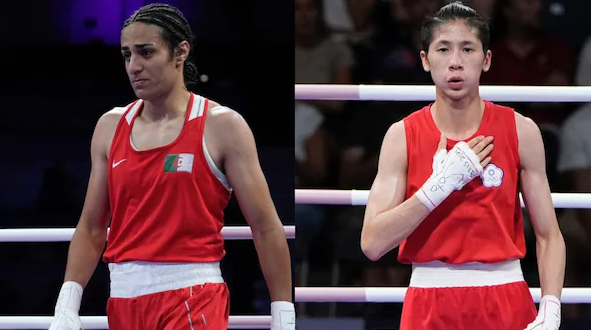Gender Eligibility Row at Paris Olympics 2024 (GS Paper 2, Issues Related to Women, Gender, Sports & Affairs, Health)

Introduction
- The Paris Olympics 2024 has been marred by controversy concerning gender eligibility, particularly highlighted by a boxing match between Algeria’s Imane Khelif and Italy’s Angela Carini.
- The issue revolves around accusations of unfair advantage and the criteria for gender eligibility in women’s sports.
- This controversy raises significant questions about the balance between inclusivity, fairness, and the integrity of competitive sports.
Background of the Controversy
Imane Khelif’s Victory and Accusations
- Details of the Match: Imane Khelif’s victory over Angela Carini in the boxing ring was met with controversy. Critics claimed that Khelif, due to her physiological characteristics associated with Disorders of Sex Development (DSDs), might have an unfair advantage.
- Public and Media Reaction: The public outcry was fueled by the belief that Khelif’s physical advantages could undermine the fairness of the competition, leading to accusations of her being a “biological man.”
International Boxing Association (IBA) Stance
- Previous Bar on Competition: In 2023, both Khelif and Lin Yu-ting were barred from competing in the IBA’s World Championship due to a “gender eligibility” test. The specifics of this test are confidential, raising concerns about transparency.
- Shift in Authority: The IBA’s decision was overridden because the IOC derecognized the IBA in 2023, leading to the adoption of different criteria for the Paris Olympics.
International Olympic Committee (IOC) Response
- Defending the Eligibility Criteria: The IOC has defended its decision, asserting that all athletes, including Khelif, met the eligibility requirements based on their gender as stated in their official documents.
- Criticism of IBA: The IOC criticized the IBA’s previous decisions as “arbitrary” and expressed concern over the misinformation and abuse directed towards Khelif and Lin Yu-ting.
International Olympic Committee (IOC) Overview
- Establishment and Mission: Founded in 1894 and based in Lausanne, Switzerland, the IOC oversees the Olympic Games and promotes Olympism—a philosophy integrating sport, culture, and education.
- Olympism: This philosophy emphasizes joy in effort, the educational value of good examples, social responsibility, and adherence to universal ethical principles.
- Constituents: The IOC, International Sports Federations (IFs), and National Olympic Committees (NOCs) are the main bodies of the Olympic Movement, with the IOC making final decisions on the Games' rules and locations.
The Gender Eligibility Debate
Sex and Athletic Performance
- Physiological Differences: Historically, sports have been divided by sex due to physiological differences. Men typically have advantages in muscle mass, strength, and endurance, linked to higher testosterone levels.
- Testosterone’s Role: The SRY gene on the Y chromosome is crucial for testosterone production, influencing athletic performance. Studies, including a 2017 paper in Endocrine Reviews, suggest testosterone significantly impacts performance.
Disorders of Sex Development (DSDs)
- Definition: DSDs involve conditions where individuals have atypical sexual development or a combination of male and female traits. They can be evident at birth, during puberty, or later in life.
Examples:
- Androgen Insensitivity Syndrome (AIS): Individuals with XY chromosomes who are resistant to male hormones, leading to female physical traits despite male genetic makeup.
- Klinefelter Syndrome: Males with an extra X chromosome (XXY), causing reduced testosterone levels and related symptoms.
- Turner Syndrome: Females with a missing or partially missing X chromosome, resulting in short stature and other developmental issues.
Current Approaches to Gender Eligibility in Sports
IOC’s Approach
- Evidence-Based Rules: Since 2021, the IOC has allowed sports federations to set their own eligibility rules based on evidence, shifting focus from testosterone levels to the gender stated in official documents.
Federation-Specific Regulations
- World Athletics: Requires athletes with DSDs to maintain testosterone levels below 2.5 nmol/L for at least 24 months to compete in women’s events.
- Other Sports Bodies: Different federations, such as FINA and the International Cycling Union, have implemented varying regulations based on testosterone levels, leading to inconsistent policies across sports.
Open Category Debate
- Proposal for an Open Category: An “open category” for trans athletes is suggested to address fairness concerns. However, this approach is debated due to practical challenges and the limited number of elite trans athletes.
Way Forward
Biomarkers
- Develop Reliable Biomarkers: Identify biomarkers that accurately assess athletic potential while respecting privacy. These markers should provide objective measurements without infringing on athletes' dignity.
Athlete Education
- Provide Accurate Information: Educate athletes on sex, gender, and eligibility rules to support informed decisions and promote understanding of the criteria.
Transparent and Inclusive Policies
- Create Clear Guidelines: Develop transparent policies that balance fairness, inclusion, and non-discrimination. Provide clear explanations for eligibility criteria and their rationale.
Collaboration Among Federations
- Harmonize Policies: International federations should work together to harmonize eligibility policies, ensuring consistency and fairness across different sports.
Respect for Human Rights
- Prioritize Human Rights: Ensure that policies protect the right of all athletes to participate in sports without discrimination, while maintaining competitive fairness.
Conclusion
- The gender eligibility controversy at the Paris Olympics 2024 underscores the complexities surrounding gender in sports.
- The debate highlights the need for balanced policies that ensure fairness while respecting the rights and identities of all athletes.
- Moving forward, transparent, evidence-based, and inclusive approaches will be crucial for addressing these challenges and fostering a fair and equitable sporting environment.


